The story starts at Miami Airport - Home for too long. I go into the
bathroom and there is an ant on the toilet seat, and water is leaking from
somewhere and splashing me. But they have a sushi bar: one where
everyone speaks Spanish, even the sushi chefs. In Maryland it would be
only the guy who clears the tables. Find myself despairing of ever
understanding it. But really, I already understand more spoken Spanish
than spoken French.
Lloyd Aero Boliviana to Santa Cruz. Dinner is at about midnight.
The traditional
Bolivian meal of Cheese Ravioli. Santa Cruz is a madhouse, but I find a
guy who speaks English and is headed to Cochabamba and I adopt him,
until I find Tami, who is working for the Peace Corps in Coche.
We spend my first day in Cochabamba wandering around--going to the
market, having lunch, having tea. The market is extensive. In some part
of that market you can find anything. Or get anything made or repaired.
Unlike here, in Bolivia they repair, reuse, and recycle everything. Tami
shows me the seat cushion that Javier made out of the packing material in
the package her Dad sent. In Puerto Villarroel we see a shoe scraper made
by nailing bottle caps to a board. Tami says that Javier takes things out
of the trash when she throws them away. This becomes a problem for me as
I have some underwear that the elastic has given out on and I want to
throw it out rather than take the risk that I will accidentally wear it
again and spend another day holding up my underwear. But I don't want
Javier to find it, or, worse yet, use it for something.
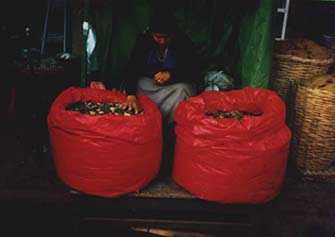
The scariest part of the market is the meat market. Huge livers,
stomachs, hearts and tongues piled up on the counter with no refrigeration
in sight. Not to mention the goat's eyes. Also in the market are the
coca leaf sellers. Women sit behind huge red lawn and leaf bags of coca
leaves with the various activators: burned banana and anise, or the
mineral mixture, which is saltier. Coca is everywhere. In the American
bars the gringos do it with baking soda, in Tami's wedding video she
demonstrates how to rip the leaf apart so you don't get the scratchy stem,
and in the countryside - "the campo" - half the people we talk to have a
wad of leaves in their mouth. I begin to get the feeling that asking
Bolivia to eradicate coca is like asking us to eradicate tobacco plants.
In the 1970's.
Tami lives in the traditional courtyard surrounded by a fortress with
Javi and their landlady and her family. The fortress wall is high, has a
locked door set in it, and broken glass set in the concrete on top. We
see this all over the city, which I find strange since in the States
people only do things like this in the high crime neighborhoods, and
Bolivia generally does not have a lot of crime. Tami tells me that she
told people here that North Americans do not build walls around their
property like that, and their response was, "well, no wonder they have so
much crime." Right inside the door is a grass area and further back is a
paved area with rooms built around the edges. The rooms open to the
courtyard and not to each other. Tami and Javier have a room that is
maybe 16X12 and a tiny kitchen with the cutest little stove that I have
ever seen, and a bathroom. Running water for dishes, flushing the toilet,
brushing your teeth, etc., runs to sinks outside. There is also running
water for the shower in the bathroom. 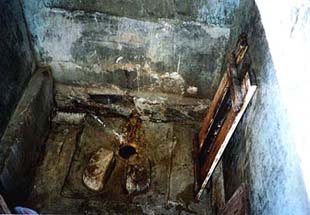 The bathroom is maybe 4X4 and the
toilet function is served by the traditional two vaguely foot-sized
concrete blocks and a hole to aim for. Follow with water. Tami warns me
that it is far preferable to much of what I am likely to find elsewhere
and also that I should get used to carrying my own wad of toilet paper.
Advice to live by, as I don't find it supplied in the bathroom anywhere
other than the Peace Corps office and the home of some Peace Corps workers
in Aiquile. Tami does not keep toilet paper in her bathroom for the
simple reason that it is also the shower. The shower comes from straight
overhead, which I have always found less than useful, and the water is
heated by an electric element in the shower head itself that the water
flows over. I'm really not sure why I was not electrocuted. There is a
pallet to put down so you don't just have to stand on those concrete
blocks while you shower, but it does kind of solve the debate about
whether it is okay to pee in the shower. As for toilet paper in bathrooms
that are not showers, the lack appears to be due to the fact that Bolivia
has no paper industry. Paper is scarce. Toilet paper is made of
post-consumer recycled paper and comes in colors not seen in nature.
Restaurants that use paper napkins cut them in half to encourage you to
use less. Other restaurants give you squares of waxy green paper that
could remove food from your fingers only by accident. My theory is that
they should use blocks of wood instead. They will work just as well and
they can be cleaned and re-used.
The bathroom is maybe 4X4 and the
toilet function is served by the traditional two vaguely foot-sized
concrete blocks and a hole to aim for. Follow with water. Tami warns me
that it is far preferable to much of what I am likely to find elsewhere
and also that I should get used to carrying my own wad of toilet paper.
Advice to live by, as I don't find it supplied in the bathroom anywhere
other than the Peace Corps office and the home of some Peace Corps workers
in Aiquile. Tami does not keep toilet paper in her bathroom for the
simple reason that it is also the shower. The shower comes from straight
overhead, which I have always found less than useful, and the water is
heated by an electric element in the shower head itself that the water
flows over. I'm really not sure why I was not electrocuted. There is a
pallet to put down so you don't just have to stand on those concrete
blocks while you shower, but it does kind of solve the debate about
whether it is okay to pee in the shower. As for toilet paper in bathrooms
that are not showers, the lack appears to be due to the fact that Bolivia
has no paper industry. Paper is scarce. Toilet paper is made of
post-consumer recycled paper and comes in colors not seen in nature.
Restaurants that use paper napkins cut them in half to encourage you to
use less. Other restaurants give you squares of waxy green paper that
could remove food from your fingers only by accident. My theory is that
they should use blocks of wood instead. They will work just as well and
they can be cleaned and re-used.
On my second day we head up to the mountains to hike near Tunari. The
plan is actually to hike on it, but we miss the bus that would have taken
us to the right place by about five minutes, so we go to another spot
someone had told us that we could hike up it from but it would be further.
In retrospect, whoever told us that we could hike to Tunari from where
this bus let out was dangerously insane. We ate breakfast at the end of
the bus line. Our restaurant consisted of one lady with vats of food on
the side of the road with a single table and two seats. The food was a
strip of meat and two potatoes cooked in a sauce with onions and peppers
and served over rice. Every meal in Bolivia is served with two potatoes
and over rice. Got back to the States with an aversion to ever again
seeing a grain of rice. Lots of Bolivian meals also come with things that
are described as "meat." Would have thought that it was the "Colonel's
nuggets" problem, but Tami says that it is usually beef, and that it is
*not* dog or cat, as the Bolivian taboos against eating these animals are as
strong as in the States. Also, while some of the meat was not the best
cut, it was muscle, not organ - organ meats are eaten in profusion here,
but if they have something that special to feed you, they are sure to
mention it. Overall, Bolivian food is good, if heavy on the starch.
Occasionally though, I see menu items, like Calda de Cabeza, that make me
wish that I had not tried to learn Spanish.
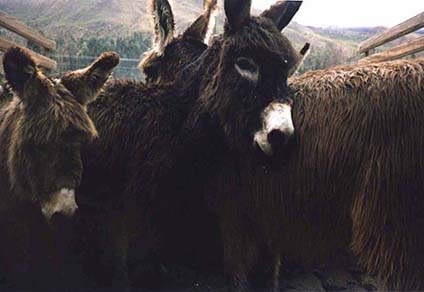
At breakfast we learn that there is a "camion," a flatbed truck with
sides used for transportation in the campo, that will take us further into
the mountains and closer to Tunari. Transportation in Bolivia is
interesting. In the city there are thousands of taxis everywhere, and
they pester you constantly to ride rather than to walk or to go somewhere
rather than to stand still. There are also lots of varieties of buses,
from the trufis which are about the size of a VW Microbus up to the
Flotas, which are full-sized buses. Then there are the camions, which
carry people to and from the campo with the things that they are selling
and the things that they have bought. Our camion into the mountains
contained about a dozen people and their purchases, which included ten
donkeys. Theoretically the donkeys got the back part of the truck, while
the people got the front part of the bed, but as the last people on, Tami
and I were pretty close to the donkey/people line, and as the truck
careened around hairpin turns up the mountain, stopped and started,
speeded and slowed, it was not unlike standing on the edge of a donkey
mosh pit. I only got stepped on once but there was one donkey I had to
keep my eyes on because he would sometimes try to kick me. So anyway,
here we are in the back of this camion, winding around curves, and holding
on for dear life (giving me this weird tan across the tops of my hands),
looking over huge drop-offs into the abyss, and I start to notice that
there are memorials along the side of the road. Lots of them. Something
to think about while dodging the donkeys.
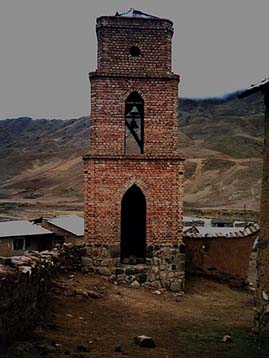
We survived though, and had ourselves dropped off in a tiny town called
Misicuni. "Misi" is cat in Quechua. A Misicunian tells us that "cuni" is
not translatable. Misicuni has about 100 residents and its own soccer
field. Everywhere has its own soccer field. I later notice, however,
that not everywhere has its own soccer ball, and see people kicking things
like soda bottles around the field. Our same Misicunian also gives us a
piece of bad news - the camions run only on Saturday and Tuesday. If we
stay here, we may not be able to get out before Tuesday. It suddenly
seems like we don't have much food with us. We decide just to walk back
along the road and catch the last truck out. Just outside Misicuni, though,
we come to a tunnel project and walk up to take a closer look. There we
learn that the tunnel will carry water to Cochabamba from a reservoir
created by damming the river near that point. Misicuni, soccer field and
all, will be under water in about three years. The same guy tells us that
engineers leave the site in the afternoon on Sunday and can give us a ride,
and that if we hike back from where we are we will come to a lake in about
four miles, and from there we can hike down to the main road to Coche in
about eight hours. We completely forget this guy is working on a tunnel
project and is probably measuring that four miles in a perfectly straight
line and decide to take his advice. In making this decision I also
somehow overlooked the fact that Misicuni itself was already so high that
putting my backpack on got me out of breath. In retrospect, you might
also wonder why I felt free to wander off across the mountains in a
foreign country without so much as a map, much less a topo. Part of the
explanation is that nothing in the Andes is any taller than a healthy
blade of grass, and that there is not much in the way of geography, other
than mountains, that stops you from just picking a direction and walking
in it. As for the mountain ridges, one simply has to pick the right spot
to cross. The rest of the explanation is that I am completely insane.
So off we go, through mountains that have transportation only two days
a week, and what do we find but people. Lots of them. In the middle of
nowhere it is completely populated. Still it is a beautiful hike. The
mountains are rolling, with rocky crests, and to the left we can
see snowy caps, and the llamas and sheep are positively cute.
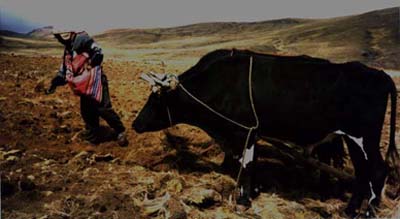
Bolivia is potato world. There are about 170 varieties here and
potatoes are served with every meal. It is planting time now and
everywhere we walk people are out behind their oxen plowing and sowing.
Yes, oxen. I saw only one tractor, and considering the terrain in which
many of the potatoes are planted, a tractor would not be much use. They
really do not do well sideways. We talk to some of them (the people, not
the oxen) and they are quite friendly and happy to talk, but they can't do
much in the way of confirming this four mile rumor.
Those of who you have been tortured by me in Maine will be happy to know
that there were times when I firmly believed that this hike would kill me.
I finally gave up and we set the tent up in a llama and sheep field so I
could rest while Tami walked to a local house to try again to find out if
this story of a lake, that surely would have to be close now, and an eight
hour walk down the other side, had any basis in reality. Tami is starting to talk
about just walking back to the tunnel the next day and catching a ride
with the engineers. She is simultaneously starting to lose her belief in
the concept that engineers even work on Sunday at all, and she tries to
prepare me for the possibility that we will be there until Tuesday.
Despite the fact that I am nearly dead, my theory is that I will have boundless energy
the next day. We can bounce right over the
mountain and walk down, no problem. Unfortunately, the people in the
nearby house do not speak Spanish, only Quechua. Not much help, though
Tami does gather that it is all right for us to be there, that Coche is way
too far away to walk, and that these people think that we are crazy.
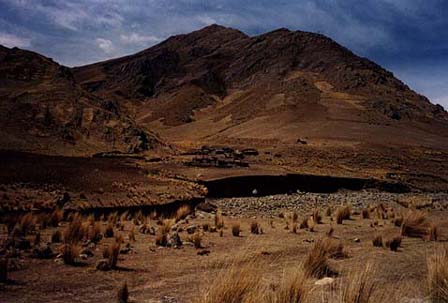
We go to bed even before the sun is down, still debating whether we
should go back to the tunnel and waylay the possibly fictional engineers
directly, or whether we should cut over to the road, which we can hit at a
point closer to the way back, and catch whatever cars there are, or, since
I am still full of theoretical energy, simply march all of the way out,
which we can surely do by Monday evening since it is all downhill after
you pass the intersection where the road goes off to Independencia. Tami
reminds me that it took four hours to get to Misicuni by truck and four
hours to get to where we are by foot. I remind her that we can cut some
of that off by cutting over to the road and that the truck never went
faster than about ten miles an hour, probably more like five. I insist
that we can walk out, and that, in any event, we won't have to because
there is bound to be some kind of vehicle we can catch a ride with on the
way out. I am half right.
I had been afraid that we would freeze to death at night, or be soaked,
but despite the fact that it did rain, and the rain was frozen on the tent
in the morning, we stayed warm and dry. I wish I could say that we were
also comfortable, but the tent we had brought, which Tami had never used
before, turned out not to be as long as five feet in any direction, so
that we could not stretch out our legs but had to sleep curled up all
night. You may think that you sleep curled up, but believe me, you
stretch out every once in a while.
In the morning, we hiked out to the road by a much more direct, and
therefore much steeper, route, and began the walk out, passing yet more
people behind their oxen plowing and planting potatoes. Before long we
learn that the Independencia Road, which is not all that far out, has
transportation every day and we have talked to two people on their way in
who are willing to give us rides on their way out. As it turns out we do
get a ride from one of the engineers, who takes us all the way back to
Coche with only one near-death experience along the way. Since I was near
death when we got the ride anyway I figured that it was a fair trade. As
for the experience, it was to be expected. Private transportation is by
far the most dangerous form of transportation in Bolivia, both to
passengers and to those outside the car. It is the only place I have ever
been where the taxi drivers drive better than other people. The horn is
used frequently, for many reasons, including, in the case of our driver,
the popular signal for "I'm going to drive like an idiot now."
Back in Coche we have dinner in the gringo quarter (classic rock but
good food) and head to Miguel's to watch Tami's wedding video. This
effort failed as the person who owned the TV that would work with a VCR
failed to show, leaving the person who had a VCR to walk back home with
it.
On Monday we head down to the tropics, this time by bus. I was happy
to learn that the buses in Bolivia are not the classic Central American
used school bus, but real buses with padded reclining seats, though they
are not designed for people the size of North Americans. Entering the
tropics there is a coca stop where everyone has to get off the bus while
the military makes a show of searching for coca. Of course, they can't do
real searches or commerce would stop, so it really isn't clear to me if
they ever find anything. It also isn't clear to me why they search in
both directions, since presumably no one is carrying coca *in* to the
growing areas. Arriving in the tropics, we stop in Irvagazana and have
lunch to the accompaniment of the end of some Freddy Krueger movie and the
beginning of some intensely bad movie called Carnosaur. Both are in
English with Spanish subtitles, which is common from what I can tell
from the videos that I see for rent. I have to wonder about the quality
of the subtitles as well since the copy of _First Wives Club_ that I see
has the title translated as _Mujeres de la Calle_ (Women of the
Street).
After lunch we find a taxi to Puerto Villarroel. The taxis are all
things like Toyota Corollas with hatchbacks and, outside the cities, the
drivers have no interest in going anywhere unless it is full. In our case
this means that there are two passengers in the front seat, three of us in
the middle and a few kids in the back before we take off. With this load
the driver sped down the road to Puerto Villarroel, which is currently
undergoing a paving project that only increases the number of small
boulders that are in the road and fly up to hit the car. The driver is so
unconcerned by this that we conclude that the car must be borrowed.
People got out of the cab and others got in along the way, but at some
point it was just us, and the driver took the opportunity to ask Tami to
translate some Rod Stewart lyrics for him. He seemed particularly happy
with the "If You Think I'm Sexy" lyrics.
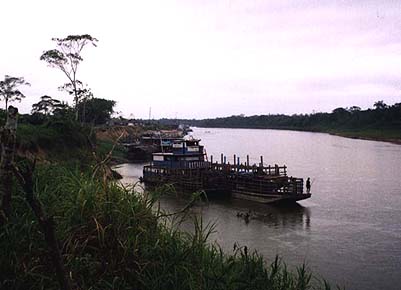
Puerto Villarroel is a small town which has largely survived by
logging, fishing, and its role as a port on the river from which barges
take pineapples, bananas and other things out to Trinidad. Right now,
however, there is not enough water for the barges to leave when they are
loaded, fishing is controlled to combat the effects of the drought on the
fish population, and the cutting of wood is tightly controlled. The
market and restaurants are relatively empty, as there are no boat people
coming through and no one in the town has money. People there are much
happier to see the rain, which is intermittent throughout our stay, than
we are. The guidebook, Lonely Planet credits Puerto Villarroel with only two hotels,
both of which it insults heavily, but in fact there are about five, and we
find a room in a hotel run by very nice people which has a balcony
overlooking the square, mosquito nets, toilets and cold showers, all quite
clean, for about $3 a night. We then go out to sample the local night
life. First a game of pool that takes forever because both of us are
pretty bad and the table is worse. It was warped in ways that I cannot
begin to describe and there were literally hills in front of a couple of
the pockets. The balls were a random sample, but you could get an even
number of solids and stripes by raiding the next table for the balls that
had already been sunk. This could not cure the fact that there was only
one eightball and one cue ball in the place. We then played Cacha, a
ubiquitous Bolivian drinking game involving a cup and five dice. Most of
the drinking results not from the game itself but from violations of its
etiquette, so it is a trap for first time players and drunks.
Our hotel is right on the plaza, such as it is, and right next to what
turns out to be the loudest bar in town, despite our guess (and the
statement of Lonely Planet) that the loud partying would be across the
Plaza at the disco. The bars didn't close until about one, after which
there was some sort of gathering of dogs at which all of the dogs, and
there are a lot of dogs everywhere here, got together to make as much
noise as possible. Then quiet, until 5:30 when all the roosters woke up
and walked down to the plaza to crow their little hearts out. It seems
unlikely that they really all walked into town to crow, but it did sound
that way. We decided that we were in the loudest town in the world.
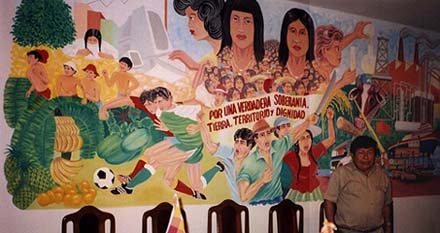
In the morning, Tami wanted to go fishing, having brought along a cool
collapsible fishing pole that she had inherited from another volunteer,
but we were concerned that we might actually catch something and have to
deal with it. A man at breakfast tells us that we should not fish here
because we will probably catch something too large for the pole and it
will break. We end up not fishing. Instead we launch ourselves into
Tami's work day, which consists of interviewing the Mayor, touring the
library, local school and TV station (pirate, but run by the government)
then going to the forestry office and the hospital. We wedge these things
in between bouts of rain and spend the rest of our time on the balcony
writing. A promised boat tour on the river on a motorized dugout washes
away with the rain.
All over the tropics the shrines of the virgin are missing their
virgins. Are there no more virgins in the tropics? Maybe. The doctor in
the hospital at Puerto Villarroel tells us that the average age at first
pregnancy is fourteen. As to the ones from the shrines, Tami's theory is
that something is being done in preparation for the Day of the Dead. Mine
is that the Pentecostals that are starting to overrun the tropics have had
them all smashed as idols. Neither of us knows, though, and we forget to
ask while we are down there. In the city, all of the virgins are in their
usual places. As for the Pentecostals, the competition for souls is
fierce. When the Catholic church fell in the earthquake in Aiquile and
the Pentecostal church remained standing, the Pentecostals told people
that it was because the Catholics are sinners. And all of the Peace Corps
workers tell me that people always ask them which they think is
better.
At 6:30 we head to the bus that is supposed to take us to Villa Tunari.
It is a through bus to Cochabamba, but they have said that they will take
us to Villa Tunari. In the first town the bus stops to round up more
passengers, and this is the point that they choose to tell us that they
want to sell our seats at the full Coche fare, so we will either have to
sit in the aisle or find another ride. We eat a skewer of barbecued beef
heart, chat with the pineapple seller for a while and still they are
nowhere near filling the bus. We decide to take a taxi. We find one that
will take us to the next town, where we can find one that will go all the
way to Villa Tunari. Nice theory, but not true - the driver that would do
that run is asleep in his taxi and has no plans to move. As it turns out
though, there are enough people trying to get there that the driver
relents and takes us the rest of the way. The taxi lets us out on the
highway at the bottom of a short hill that leads into "downtown" Villa
Tunari. The road is dark and as we head up I notice a group of about six
men headed our way. I don't like it, their body language is wrong. My
decision from the beginning of this trip was to trust Tami and not to be
afraid if she is not. Every once in a while, though, I remember that this
is the same Tami that voluntarily lived on O Street. Still, I don't have
a lot of choice - the differences in the cultures make it difficult for me
to gauge the danger, or lack of it, in situations here. Anyway, I am very
relieved when one of the men turns out to know Tami. It is Jutie, a Peace
Corps tourism volunteer, who is out to plan a tour in this area in
November. He is with his Bolivian counterparts, who are, in fact, out
cruising for young girls. Jutie is disgusted, but coping. We go on to our
hotel. No balcony here, but the rooms open onto a courtyard with lots of
plants. Very nice, and $3 a night just like the last one, though we could
pay $60 if we went across the highway to the one with the hot showers.
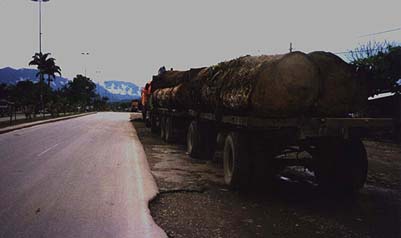
Once settled, we go out for a light dinner, an empanada perhaps, and meet
Professor Michael, the English teacher at the local school. His English
is good - slow but grammatical - but his vocabulary is missing some
surprising words, like the one for 'to die.' He is a Mormon - lots of
missionaries of all stripes down here - and lived in the States for eight
years. We agree to speak to his class before we leave. The kids in
Professor Michael's class are lively and have lots of questions but they
don't speak much English. They know "hello", "goodbye" and "teacher," but that
is about it. Bolivians that speak English are rare, though it still makes
me jump when Tami and I have conversations in English that would embarrass us if
anyone understood them. Prof. Michael wants his students to hear English
spoken. We want them to know there is a whole world out there and that it
is open to them if they exert themselves, and of course, if they do not
get pregnant when they are fourteen. Not at all sure what made it through
in the translation.
After that it is a hike in the monkey park. Tami hikes in her pajamas
rather than risk getting her dress wet, or even muddy. Since Bolivians do
not wear pajamas, it seems that they are unlikely to notice. It is rainy
off and on again, and cloudy, though we manage to increase our sunburns.
The rainy season has started a bit early. Since they had no rainy season
at all last year, I really cannot begrudge them the rain.
The point of the monkey park is to take monkeys (and the occasional
other animal) that had been raised as pets but turned out to be monkeys
anyway and reintroduce them to the wild. Tami says that they have had
some success in the three years that they have been here. Presumably they
must have operated differently at some point then, because it is now run
much like a petting zoo, with the monkeys coming down, climbing on
visitors and picking their pockets. A monkey removes the button from my
camera. It is retrieved, but falls off the next day, requiring me to go
have a new "monkey-proof" one installed. When there are no tourists the
volunteers, all Canadian do-gooders with no obvious background in the
field, play with the monkeys, groom them, and generally spoil them. I
don't see any monkeys choosing to leave this and strike out on their own.
Meanwhile the path that goes through the rest of the park is falling into
near unuseability. A single volunteer is working on this path, which
could keep them all busy for a month.
On our return, we have more fun with the Bolivian transportation
system. We have reservations on a bus to Coche at one, but when we show
up they are holding the bus to try to get more passengers. At two they
give up and give the ticket money back. We hitch a ride on a passing bus
and spend the ride sitting and standing in the aisle. If this area wants
tourism, they are going to have to convince the bus lines not to do this.
On our way back to Coche, we stop at the home of Tami's Bolivian host
family where she lived when she first got here. Her Bolivian mother, Dona
Esther, is cooking dinner for us. Dona Esther's house is luxurious
compared to others we have seen. She has a large yard, a two-story house
and a separate building with three more rooms. Her kitchen is huge and
has a full size refrigerator and a stove and separate large oven. The
maid/caretaker has her own kitchen and they have a new car. They even
have a full modern bathroom, which sits unused while they wait for the
town to make good on its promise to run water lines. The current bathroom
is not modern at all, but is a hole in the ground outside. Water had come
from the well, but that dried up in the drought last year and water now
has to be brought down from property they own that is higher up. This is not
unusual. The only place we have been that seemed to consistently have
water was Puerto Villarroel, which was right on the river. Villa Tunari
had water only off and on even though it was raining, and people had pots
under the drainspouts to catch water. Since some of these places were
restaurants it kind of made me wonder what the food was being cooked in.
Even in the most modern parts of Coche, with their highrise office and
apartment buildings, it is not unusual to have water only two hours a day,
though many have tanks on the roof that they fill to make water available
the rest of the day. This, of course, explains why poor little Misicuni
is to be flooded. What is a town of 100 against half a million people
who want water?
We have come to Dona Esther's for the express purpose of eating guinea
pig, which many Bolivians raise at home for that purpose and eat with
family and friends. I did not see it in restaurants. Our guinea pig is
served with potatoes, fava beans, rice, peas, onions, and chunos (insert
~), a freeze dried potato from the altiplano that is considered a
delicacy. Freeze drying is a very natural thing to happen to a potato in
the winter in the altiplano, and requires only that they be turned every
few days. Once dry they last for 25 years or more, and older ones are
considered better. I did not find them to be that much more distinctive in
taste than any other potato, but the entire meal was delicious, including the
homemade sauce that went with it. As for guinea pig, it doesn't really
taste like chicken, but it is not that far off, as a reference point. As
you can imagine, there is not much of it. Everyone in Tami's Bolivian
family was very interested in whether I liked guinea pig and I was asked
about it repeatedly. Apparently they are aware of the rather different
status of guinea pigs in the States.
Thursday was a day to get things done and we spent it on errands, a
task that continued Friday morning. We then stopped for lunch, peanut
soup and tongue, which was good, but terrified me anyway as it looked like
a tongue and I kept envisioning it in a cow's mouth. Even more
frightening for me from a gustatory point of view was that I noticed
people in the restaurant pouring Coca-Cola into their beer. Apparently
this is a common practice. We then took the bus to Aiquile for the
Charango festival and for a Halloween party that was being thrown by some
Peace Corps volunteers there. The charango, by the way, is a stringed
instrument, kind of on the small side, with four sets of two strings.
They are carved from wood, though people in the States have told me that
they were once made from armadillo shells. Didn't see any armadillos in
Bolivia, but then, there isn't much to run them over, and that is how I
usually see them.
The bus ride to Aiquile is long, but the scenery is incredibly beautiful. The
second half is unpaved and winds through switchbacks and along mountain
ridges through seemingly endless mountains. Early in the trip Stephanie,
a PC volunteer who is a friend of Tami's, discovered that her walkman had
been stolen from her bag when she left the bus to pee, together with her
favorite tapes and a bag that her father had given her. I don't usually
leave stuff around that is that fun to steal. In fact, I try not to
travel with stuff that is that fun to steal. Even my camera has value
only because of the pictures in it. Still, I have also left stuff on
buses that I really could not afford to lose, so I can't call her an
idiot. And, I hate being robbed as much as the next person so I cannot
blame her for being upset. But, when I heard the plan to stop and bribe
the police to search the bus, I became perturbed. In the first place, I
would think that the bribe would cost more than the Walkman. Besides
that, I don't like the police. I do not trust the police. I was raised
that way as a child and nothing that has happened since then has changed
my view. In addition, we are talking about delaying and inconveniencing a
lot of people, all for a cheap American toy for a gringa, and I anticipate
being embarrassed to death by association. Fortunately, the bus driver is
apparently not in on the plan and we go through to Aiquile without a
stop.
The house where Michelle and another Stephanie live in Aiquile is
luxurious, in that it has a large yard, two stories, running water and a
flush toilet. Their shower is pronounced great, though you have to unplug
the refrigerator to use it. Can't have everything.
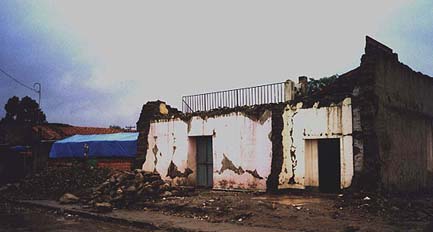
We have dinner in a chicken place down the street. The tables are set
up in a concrete area under a tarp and my first thought is that the
restaurants here are all open air like the ones in the tropics. Later I
realize that the building had fallen down in the earthquake earlier this
year (6.8 on the Richter scale) and they are doing the best they can.
The chicken place is also a karaoke bar and the music is deafening.
Young guys sing along with all sincerity to intensely sappy songs in
Spanish. The videos all feature scantily clad women posing in settings
that have nothing to do with the lyrics. Cheesiness abounds. Honestly,
cheesiness and scantily clad women are a predominant feature of Bolivian
popular culture. Cheesecake calendars are everywhere, even in middle
class homes, together with posters of VanDamme and Schwartzenegger, and
posters of Jesus and Mary. Go figure.
It is Friday night and the Charango festival is barely getting started.
We watch the infant class of charango players. Then a danceable band
plays and I even dance a little, despite my known hatred of organized
dancing, until my knee threatens to secede.
In the morning as we are waking up Stephanie 2 tells us that she is
going to get a schedule for the festival which they are "just now putting
together." The fact that the schedule is being developed on the second
day of the festival is so inherently Bolivian that everyone cracks up. In
real life, I don't think that a schedule ever appears. One simply
discovers what is going on by chance, or not at all. In the afternoon we
take a tour that we know about because Stephanie 2 and Michelle organized
it as a project for their youth group. We have a choice of earthquake,
artisans, or history, pick history, and turn it into all three with our
questions. We are the first tour and we adjust it to suit ourselves,
adding stops for things that interest us. Among those is a man who has a
hat repair shop in his tent in the camp for people whose homes were
destroyed. He repairs felt hats so that they look new, (remember nothing
is thrown away in Bolivia) and can do about five hats a day at 13 Bolivianos a hat,
which means that he makes about $12 a day. That sounds really terrible,
but in Bolivia he probably lives okay on that. We also talk to a man who
has a sort of forge and a hand-operated bellows which he uses to make door
hasps, axe-heads, and other items out of metal from used car parts. His
forge is on the site where his house was. The kitchen is still standing,
but the rest is just a flat area with a tent on it.
Our tour guide is more than happy to talk about her own experiences with
the earthquake, in which she received broken ribs and internal damage when
her house fell. She tells us that the pressure of being squished to death
by a house causes people's teeth and eyes to pop out, so that when you
find them, their teeth and eyes are next to them. I personally could have
lived without this part of the tour, but now I have inflicted it on
you.
The tour guide also told us that the reason that the street
that we are staying on is called Calle del Diablo is that sometimes
drunks on that street encounter a dark figure in a black cape. The story
has it that once a person has seen this creature they have a nasty
personality change and within four months they are dead. Great place for
a Halloween party.
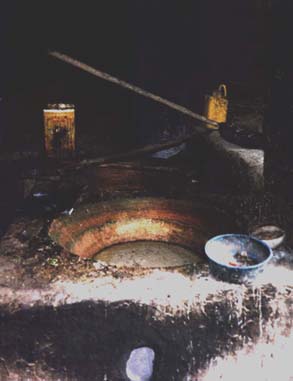
Another stop on the tour, this one planned, was at the chicheria to see
how chicha, the fermented corn beverage that is the alcohol of choice, or
at least of availability, all over the campo, is made. I don't remember
much of the process, but the smell and the flies were enough to convince
me not to drink any of it. And that was even before I saw corn that was
part of the process drying on the sidewalk in front of another chicheria
in Mizque. The last stop was the oldest house in Aiquile, though it is
not clear how long it had held this title. It is abandoned and decrepit,
and the door was open when we got there. Inside we find a bed and a pile
of books, most in Spanish, some in French, most of them about law, and all
of them over 100 years old. Our guide tells us that we can take the books
if we want but we need to get out of the house as we are not supposed to
be there. Note for those of you in the US: Do not try this at home.
Oddly, the house shows no sign of use or abuse by locals: no graffiti, no
signs that it is a love nest or a hangout.
The French law book turns out to be pretty boring, but it does tell me
that the Bolivian "anticretico" system, which I had taken to be a Bolivian
oddity, is actually a part of the Napoleonic Code. Under this system, one
pays a sum to the landlord when moving into a house or apartment, lives
there for whatever period of time, and at the end moves out and gets
the entire sum back. Theoretically, the interest on the money is the
rent, but in reality it is not uncommon that the landlord spends the money
and the renter retrieves the deposit from the person who moves in next.
In effect then, the landlord has put themselves in a position where
the property has to be rented forever at no further gain until such time
as the money can be collected to pay it off. As you can imagine, serious
problems occasionally arise, as in Aiquile, where people with anticretico
arrangements on houses that fell had nowhere to live and no new tenant to
get the money back from.
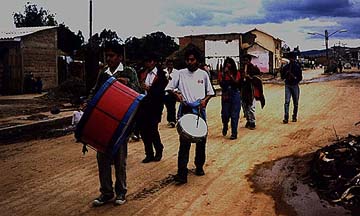
The festival on Saturday was much like Friday except that the charango
players were older and presumably better (I'm not much of a judge of
charango playing) and there was less other entertainment to break things
up. There were rumors that a band from Santa Cruz would play later and
that Orlando, a popular singer who lives in Aiquile, would sing, but about
11:30 we get bored with waiting and go back to Calle del Diablo to start the
party. As it turns out, there is nothing to drink at this party but
chicha, so, for me, it is a sober night. In addition, they had trouble
getting the dance music together, so I chat with people until about two
and go to bed. Although it later sounded like the music problem was
corrected, I did not get up but slept. Much later, after everyone had come
to bed, an extremely drunk Bolivian guy came, sat down practically on my
head and tried to lie down and go to sleep. Since Tami, Javier, Stephanie
and I were all asleep across the same bed, there wouldn't have been room
if he had been our best friend, and there was certainly none for a drunken
stranger. We oust him and he gets up and falls asleep in Stephanie's
suitcase. Finally we get his friends, who come up and escort him out for
us. Quite the confusion, but it did finally explain why so many people
there slept under mosquito nets even though there were no mosquitos --
they kept out the drunks.
In the morning I passed up the opportunity to eat chicherone and took a
walk into the hills over Aiquile. Chicherone is pig parts and salad and
is associated with chicherias because all of them keep pigs which eat the
corn mash that is left over when the process is complete and generally
contribute to the distinctive smell of the establishments. Honestly, they
are probably some of the healthiest, happiest pigs in Bolivia. What
concerned me, besides the fact that I needed a walk more than I needed
food, was more the salad than the pig parts, as fresh vegetables are a
major potential source of intestinal distress in places where the water is
questionable.
From Aiquile we went by camion to Mizque. The weather and the scenery
were beautiful, and while the camion was packed with people, there was no
livestock, with the exception of a tiny pig in a poke. Him I did not even
notice until he escaped from his owner when they got off and went running
down the road. Far better than the donkeys on the mountain camion at the
beginning of the trip.
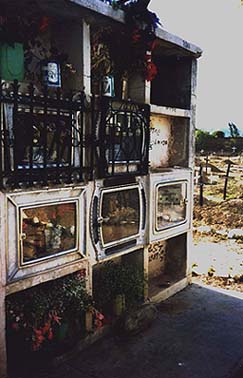
Mizque is a quaint and beautiful town in a very green part of the
valley down from Aiquile. Some buildings are cracked from the earthquake,
but very few fell. We go to Tami's house in Mizque - one room and a
courtyard, but very nice - and from there to the cemetery. The cemetery
has both above ground and in ground burial. Most of the above-ground are
in sets of compartments, though some are free-standing adobe structures.
The compartments are capped with cement, and the plain ones are simply
painted, while fancier ones get a cap that looks kind of like a microwave
oven front, with flowers, statues and other decorations. After ten years
the bones are removed and burned and the space is reused. I don't think
that they do this with the adobe mounds, but one of them has collapsed and
the bones are visible inside.
After the cemetery we take a quick walk around the plaza and it is time
to catch the bus back. The ride is shorter and easier than the one to
Aiquile, but still long and when we get back I am exhausted. We eat fried
chicken, french fries and fried plantains (no rice!) and watch _Big_ on
television. Seeing such a down home North American movie in Spanish is
hilarious and I somehow manage to stay awake all the way through it.
And with that quiet evening my time in Bolivia ended, as does this
story, as I will spare you my traumas in getting home.
HOME RAGE
 The bathroom is maybe 4X4 and the
toilet function is served by the traditional two vaguely foot-sized
concrete blocks and a hole to aim for. Follow with water. Tami warns me
that it is far preferable to much of what I am likely to find elsewhere
and also that I should get used to carrying my own wad of toilet paper.
Advice to live by, as I don't find it supplied in the bathroom anywhere
other than the Peace Corps office and the home of some Peace Corps workers
in Aiquile. Tami does not keep toilet paper in her bathroom for the
simple reason that it is also the shower. The shower comes from straight
overhead, which I have always found less than useful, and the water is
heated by an electric element in the shower head itself that the water
flows over. I'm really not sure why I was not electrocuted. There is a
pallet to put down so you don't just have to stand on those concrete
blocks while you shower, but it does kind of solve the debate about
whether it is okay to pee in the shower. As for toilet paper in bathrooms
that are not showers, the lack appears to be due to the fact that Bolivia
has no paper industry. Paper is scarce. Toilet paper is made of
post-consumer recycled paper and comes in colors not seen in nature.
Restaurants that use paper napkins cut them in half to encourage you to
use less. Other restaurants give you squares of waxy green paper that
could remove food from your fingers only by accident. My theory is that
they should use blocks of wood instead. They will work just as well and
they can be cleaned and re-used.
The bathroom is maybe 4X4 and the
toilet function is served by the traditional two vaguely foot-sized
concrete blocks and a hole to aim for. Follow with water. Tami warns me
that it is far preferable to much of what I am likely to find elsewhere
and also that I should get used to carrying my own wad of toilet paper.
Advice to live by, as I don't find it supplied in the bathroom anywhere
other than the Peace Corps office and the home of some Peace Corps workers
in Aiquile. Tami does not keep toilet paper in her bathroom for the
simple reason that it is also the shower. The shower comes from straight
overhead, which I have always found less than useful, and the water is
heated by an electric element in the shower head itself that the water
flows over. I'm really not sure why I was not electrocuted. There is a
pallet to put down so you don't just have to stand on those concrete
blocks while you shower, but it does kind of solve the debate about
whether it is okay to pee in the shower. As for toilet paper in bathrooms
that are not showers, the lack appears to be due to the fact that Bolivia
has no paper industry. Paper is scarce. Toilet paper is made of
post-consumer recycled paper and comes in colors not seen in nature.
Restaurants that use paper napkins cut them in half to encourage you to
use less. Other restaurants give you squares of waxy green paper that
could remove food from your fingers only by accident. My theory is that
they should use blocks of wood instead. They will work just as well and
they can be cleaned and re-used.










